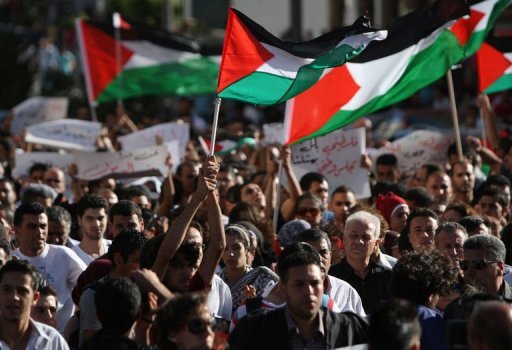
A Palestinian "village" on land slated for Israeli settlement could draw new attention to non-violent Palestinian protests against Israeli occupation and be a model for future action, activists say.
Early on Sunday, some 500 Israeli police moved to evacuate the West Bank Palestinian protest camp of Bab al-Shams, a tent village activists set up on Friday in the controversial E1 area outside Jerusalem.
The camp, named for a novel whose title means "Gate of the Sun" in English, was intended to draw attention to Israeli plans to build settlements in the area, which the Palestinians say would crush their hopes of a contiguous future state.
Activists from the grassroots Palestinian Popular Struggle Coordination Committee have years of experience protesting Israeli measures including home demolitions, the construction of the separation barrier and land confiscation.
But for this protest, PSCC coordinator Mohammed al-Khatib came up with something different.
"The idea was to do a quantum leap shift and build on prior achievements in the popular struggle, and to stimulate everyone," Khatib told AFP.
Some 250 activists arrived at the site on Friday, erecting tents on the land before announcing they had established "a new village called Bab al-Shams on land in what Israeli refers to as area E1.”
Khatib said secrecy in preparing the protest was the key to its success, catching Israel off guard and allowing media to access the site before Israel declared it a closed military zone.
But he said the non-violent nature of the protest was even more important, noting that even during the eviction process there was no violence from protesters.
"We shouldn't give the occupation any motive or excuse," he said, adding that activists wanted to show "this is not a case of two armies fighting: we are civilians demanding our rights to freedom, independence and dignity."
Palestinian grassroots activists have been promoting non-violent protests for years now.
But the Bab al-Shams protest was a new twist for the movement, which has counted successes in winning changes to the routes of Israel's barrier, but also seen weekly gatherings at flashpoint West Bank villages dwindle in size.
"Bab al-Shams was a direct challenge to the shift of Israeli policy towards the extreme right," Abdel Majid Suweilim, a professor of political science at Al Quds University, told AFP.
"The message the activists are sending is that it is no longer worth talking about negotiations or international pressure, and that on the ground there should be a democratic, resilient, peaceful popular resistance," he added.
He pointed out that the protest was led exclusively by activists, showing "that the Palestinian people has started taking responsibility in making the political decisions, not the leadership."
But Nour Odeh, a spokesperson for the Palestinian government in the West Bank, pointed out that Palestinian prime minister Salam Fayyad has long called for a non-violent protest movement.
"What [they] … did is one more innovative way of embodying Palestinian resistance.It's a beautiful statement of non-violent resistance and shows the connection to the land and the bankruptcy of the occupation," she told AFP.
She predicted similar protests, focused around Palestinians laying claim to land where settlement construction is planned.
"The fact that right now the battle is about this unprecedented frenzy of settlement construction will probably be the motivation behind the way popular resistance expresses itself," she said. "That's why I think Bab al-Shams was born. And that's why I think that it could continue."



